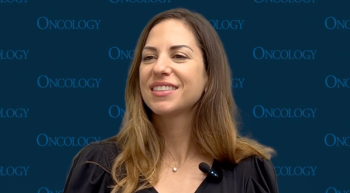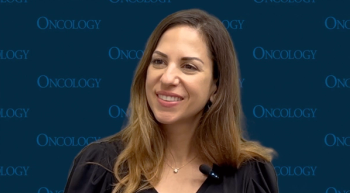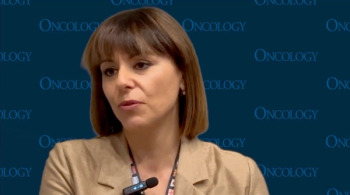
Oncology NEWS International
- Oncology NEWS International Vol 11 No 12
- Volume 11
- Issue 12
FTI Achieves Long-Lasting Responses in MDS Patients
SAN FRANCISCO-The investigationalfarnesyl transferase inhibitor(FTI), R115777 (tipifarmib,Zarnestra) causes robust clinical responsesin some patients withmyelodysplastic syndrome (MDS),but these responses are not correlatedwith the drug's ability to inhibitfarnesyl transferase, according to astudy presented at the 93rd AnnualMeeting of the American Associationfor Cancer Research (abstract 4959).
SAN FRANCISCO-The investigationalfarnesyl transferase inhibitor(FTI), R115777 (tipifarmib,Zarnestra) causes robust clinical responsesin some patients withmyelodysplastic syndrome (MDS),but these responses are not correlatedwith the drug's ability to inhibitfarnesyl transferase, according to astudy presented at the 93rd AnnualMeeting of the American Associationfor Cancer Research (abstract 4959).The hypothesis-driven clinical trialwas a collaboration between M.D.Anderson Cancer Center, where thepatients were accrued, and the H. LeeMoffitt Cancer Center and ResearchInstitute, Tampa, where the biochemicalcorrelative work was carried out."In every patient, the moleculartarget was hit, but only 30% responded,"said researcher Said M.Sebti, PhD, professor of oncology,biochemistry and molecular biology,Moffitt Cancer Center. "Ourstudy tells us that inhibition offarnesyl transferation is critical forresponse, but, by itself, it does notcorrelate with response." Dr. Sebtiis also director of Moffitt's DrugDiscovery Program.In the study, 6 of 20 evaluablemyelodysplastic syndrome patientsachieved a hematologic partial orcomplete response to R115777, saidlead researcher Razelle Kurzrock,MD, professor of medicine, M.D.Anderson Cancer Center. Some ofthe responses have been quite durable,lasting up to 15 months. Responseswere seen at all dose levels,and did not correspond with theability of the drug to hit its moleculartarget and inhibit farnesyl transferase.The study suggests that the sixpatients who responded must havea molecular signature-a blueprint-that requires farnesyl transferasefor tumor survival. "That'swhy we see responses in these patients,"Dr. Sebti said.Eligible patients had received lessthan two prior therapies and hadadequate renal and hepatic function.Myelodysplastic syndrome patientsof all subtypes were included in thetrial.The patients received R115777orally twice a day for 3 weeks of a 4-week cycle. Dosing started at 300mg twice daily and increased up to900 mg/d until patients showed toxicityor no longer benefited fromtherapy. Three patients respondedat 600 mg/d, two at 800 mg/d, andone at 900 mg/d. "There was morethan 80% farnesyl transferase inhibitionwith every patient," Dr. Sebtisaid. The enzyme did not come backto basal level even 1 week after stoppingthe drug.Six of the patients, but only twoof the responders, had Ras mutations,indicating that these mutationsdid not correlate with response,Dr. Kurzrock said. Inmyelodysplastic syndrome, 30% to40% of patients have a Ras mutation,making it an interesting diseasefor studying FTIs.The main serious side effect wasgrade 3-4 myelosuppression. "Othertoxicities at grade 3-4 were observed,but they were less frequent,"Dr. Sebti said.Dr. Kurzrock noted that althoughthe 30% response rate is modest, "theresponses occur at doses that haveminimal toxicity, even in elderly patients."The patients in the studyranged in age from 50 to 83 yearsold (median, 66).As predicted, R115777 was a selectiveinhibitor of farnesyl transferaseand not geranylgeranyl transferase(GGTase). "We have seen thisin animal models, but it is nice tosee it in patients," Dr. Sebti said.The researchers also looked at theeffect of the drug on oncogenic signalingpathways. R115777 inhibitedthe prenylation of the exclusivelyfarnesylated protein HDJ-2 in allpatients, but this did not correlatewith a clinical response. "With thisdrug, there seems to be some effectson oncogenic signaling pathways,but they do not correlate with response,"Dr. Sebti said.Since one of the downstream effectsof Ras is the induction ofcytokine synthesis, the researchersalso measured serum levels of TNF(tumor necrosis factor)-alpha. Respondingpatients had a 42% dropin TNF-alpha, while nonrespondersexperienced an 11% increase.The study reveals that farnesyltransferase targets "are just housekeepingproteins," Dr. Sebti said."What we need now is the blueprintfor the tumors that depend onfarnesyl transferase," he said.In a future study, the researcherswill examine the molecular profiles ofall patients who respond to the drug,Dr. Sebti said. "We are looking forprofiles that could lead us to predictwhich type of myelodysplastic syndromepatients will respond."
Articles in this issue
about 23 years ago
Stereotactic Radiosurgery Benefits Brain Met Patientsabout 23 years ago
Cancer Risk From Tainted Polio Vaccine Undetermined: IOM Reportabout 23 years ago
Tailored Messages Motivate Women to Get Mammogramsabout 23 years ago
Chemo/Rituximab Is Effective as First-Line CLL Therapyabout 23 years ago
Preoperative Capecitabine/RT Downstages Rectal Cancerabout 23 years ago
Intraoperative Lymphatic Mapping Enhances Cancer Stagingabout 23 years ago
Rituximab Ups Survival in Aggressive and Indolent NHLabout 23 years ago
Genzyme Molecular Oncology Begins Kidney Cancer Vaccine Trialabout 23 years ago
Lower Breast Cancer Survival in Hispanics: New Mexico StudyNewsletter
Stay up to date on recent advances in the multidisciplinary approach to cancer.





































